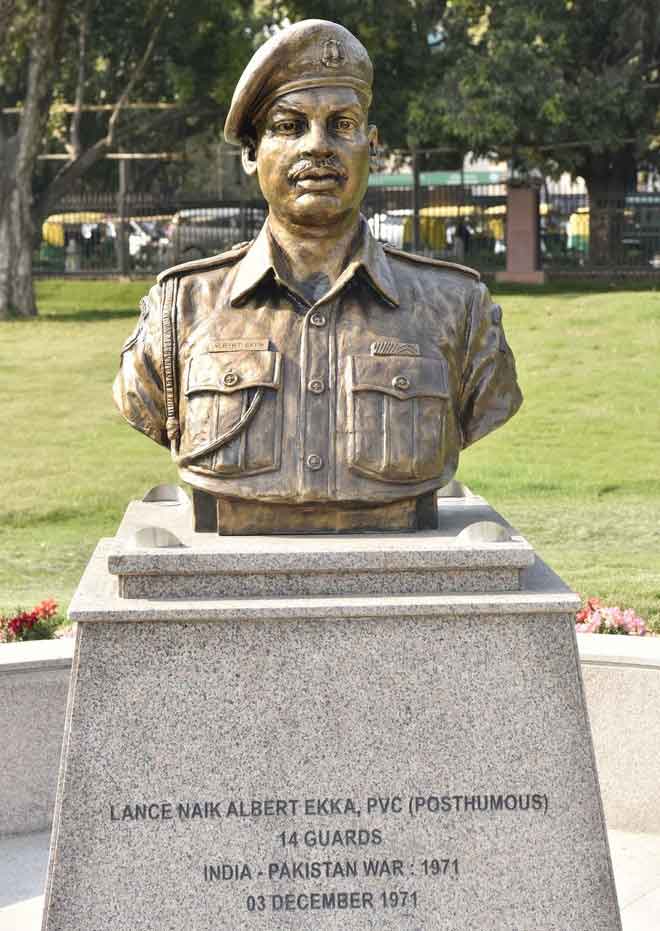
Many accounts of the Bangladesh Liberation War of 1971 have concentrated more on the later glorious phase when victory of the Bangladesh liberation fighters and the Indian forces fighting in close cooperation with each other was achieved, or was close to being achieved. This glorious and well-deserved victory should not , however, lead us to neglecting the fact that victory was far from assured in the early days of the liberation war. Apart from the fact that the Pakistani forces had the support of very cruel local collaborators, the bigger threat came from the wider support of the USA and China for Pakistan.
It was in this initial stage that the Brigade of Guards of the Indian Army was poised at a critical position near Agartala ( Tripura) very close to the border. In this brigade there was a 29 year old soldier named Alberta Ekka ( from a village near Ranchi in what is now Jharkhand state and what was then Bihar state). He had already completed nine years service, rising to be a Lance Naik, and had earned a well-deserved reputation both for his great courage, deep commitment and great fighting abilities in difficult conditions( attributed partly to childhood and teenage days being spent near a forest, learning to cope with high-risk situations).
This unit of the army now had a very difficult two-edged challenge before it. On the one hand Agartala had to be defended from the formidable and well-armed Pakistani force posted across the border at Gangasagar and Akhaura. If Agartala fell to the enemy forces, or even remained besieged for some time, the Indian army on the Eastern Front would be forced into a defensive position instead of the fast forward role that was expected of it. On the other hand, if in admittedly very difficult conditions the army unit stationed here could move forward and capture Gangasagar, then this would pave the way in very significant ways for the further advance of the Indian army which was very necessary. Ekka’s seniors took the decision to take the risk of moving forward on December 3.
Seen from the perspective of the Pakistani army officers, they had secured their position across the border rather well in a well-built area, with many bunkers and strong fortifications. The risks of an attack from the heights had been reduced by laying landmines extensively. Any assaulting army would have to think twice or more as they would face destruction from landmines as well as enemy fire including machine guns placed in well-fortified positions.
So when the India army advanced, they knew it is going to be a very tough battle. Braving bullets and landmines, they plunged forward. Albert Ekka, on the left side, noticed with concern that several of his fellow-soldiers were becoming the target of a light machine gun placed with great strategic impact. Taking the initiative, at the almost complete risk of his life, Albert attacked the bunker and the machine gun became silent after this. Lives of many Indian soldiers were saved.
Albert Ekka was injured badly in this action and in the middle of the fighting a suggestion was made to evacuate him to save his life. But Ekka refused this suggestion and moved ahead.
As the brave unit moved closed in on the Pakistani defence, a new threat emerged. This was a medium machine gun placed by the Pakistani side on the second storey of a well-fortified building. The maximum losses for the advancing Indian soldiers now came from this machine-gun. Injured and bleeding, Ekka gain took the inititive and started crawling towards the machine gun. It was like walking into the waiting jaw of a huge crocodile, but Albert Ekka persisted. Getting close to the building he summoned all the energy of his weakening body to lob a grenade to the second storey of the building where the machine gun was installed. This obviously caused damage but the enemy was also quite persistent. The machine gun continued to fire. Now Albert did the seemingly impossible. He scaled the wall despite all his injuries and took the enemy hands on. Soon this medium machine gun was silenced.
Now the India soldiers could advance rapidly and the battle was soon won. But by now Albert Ekka had breathed his last.
His colleagues praised his courage in the highest terms as the PVC or Param Vir Chakra, the highest honour of valour for action against enemy, was conferred on Albert Ekka posthumously.
A postage stamp was issued in his name and several places in Jharkhand and Tripura were named after him.
He left behind his wife Balamdina and son Vincent. His wife continued to be invited to many functions of his army unit.
In 2012 the Government of Bangladesh invited Balamdina and another Indian officer of the same battle to honor them as Friends of Bangladesh. Balamdina also went to Gangasagar with a senior officer of the Bangladesh army and a senior officer of the Indian army. She stood at the site where her husband had made his supreme sacrifice and took the soil there in her hands.
Balamdina, a simple and quiet woman, died very recently in April 2021 , leaving behind son Vincent, his wife and four grandchildren. It is a duty to take good care of the family.
Bharat Dogra is a journalist and author. His recent books include When the Two Streams Met ( freedom Movement ) and Protecting Earth for Children).
GET COUNTERCURRENTS DAILY NEWSLETTER STRAIGHT TO YOUR INBOX















































